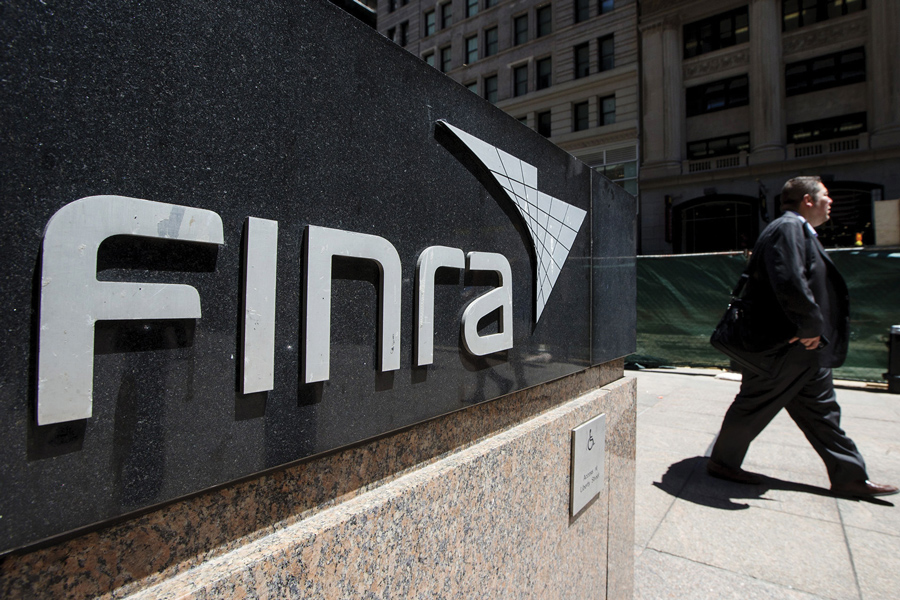

The Financial Industry Regulatory Authority Inc. on Tuesday issued its annual roundup of concerns related to the retail wealth management industry, and in an update, the securities industry self-regulator said it was adding developments in "crypto assets" to its laundry list of major concerns for the brokerage industry.
Finra has focused on crypto assets, the broad term for digital assets, in past reports; in 2023, its report mentioned the crypto-asset market in the context of cybersecurity. But in this year's report, the "2024 Finra Annual Regulatory Oversight Report," Finra said it was keeping tabs on salespeople and financial advisors who are involved in the marketing and sale of digital assets.
"Finra has identified associated persons engaged in a range of crypto asset-related activities through [outside business activities] or [private securities transactions,]" according to the 90-page report, including "proprietary trading, operating investment funds that invest in crypto assets, selling private placements or crypto asset offerings, and participating in crypto mining operations."
Securities regulators, including the Securities and Exchange Commission, have warned steadily about the potential risks of investing in crypto assets. Broker-dealers in the past have shied away from allowing their financial advisors to invest directly in bitcoin and other such digital assets.
The signal by Finra that it has "identified" financial advisors and salespeople tied to digital assets comes as the SEC is expected to make a decision on approving spot bitcoin exchange-traded funds. If approved, many believe such ETFs would be a boon for digital investors. Exchange-traded funds that invest in bitcoin futures have already been trading; the ProShares Bitcoin Strategy ETF (BITO) launched in 2021.
A $10,000 investment in BITO when it debuted in October 2021 would be worth almost $6,890 as of Monday, a decline of 31%, according to the company's website.
"We’ve seen crypto-related selling-away schemes, and huge losses in the bitcoin futures ETFs that brokers recommend to clients," said Andrew Stoltmann, a plaintiff's attorney. "It's due time that Finra paid full attention to it."
In addition to firms that have been specifically approved to engage in crypto asset securities business, Finra has asked broker-dealers to notify the self-regulator if the firm or its affiliates engage or plan to engage in crypto asset-related activities, including activities related to crypto assets that are not securities, according to the report. Some broker-dealers have established relationships with affiliates or other third parties to grant their customers access to crypto asset-related, non-securities activities, according to the report.
Finra has also asked broker-dealers to complete a questionnaire related to their activities in the crypto asset space, as well as their affiliates’ activities.
Other basic, meat-and-potatoes topics that Finra plans to focus on this year include cybersecurity, Regulation Best Interest and Form CRS.
'FINRA has observed an increase in the variety, frequency and sophistication of certain cybersecurity incidents, including the establishment of imposter websites, insider threats, ransomware and cybersecurity events at critical vendors," according to the report.
Finra has also been examining firms' implementation of Reg BI and Form CRS obligations dating back to 2023. When it comes to Reg BI, broker-dealers must be wary of selling too many alternative investments to a client, according to Finra.
Reg BI prohibits brokerages and registered representatives from putting their financial interests ahead of their clients’ interests and requires that they disclose and mitigate conflicts of interest. The measure went into force in June 2020, after being approved by the Securities and Exchange Commission a year earlier.
Firms should be careful about "recommending complex or illiquid products that are inconsistent with the retail customer’s investment profile by, for example, exceeding concentration limits specified in a firm’s policies, or comprising a sizable portion of a retail customer’s liquid net worth or securities holdings," according to the report.

Blue Anchor Capital Management and Pickett also purchased “highly aggressive and volatile” securities, according to the order.

Reshuffle provides strong indication of where the regulator's priorities now lie.

Goldman Sachs Asset Management report reveals sharpened focus on annuities.

Ahead of Father's Day, InvestmentNews speaks with Andrew Crowell.

Cerulli research finds nearly two-thirds of active retirement plan participants are unadvised, opening a potential engagement opportunity.
Barely a decade old, registered index-linked annuities have quickly surged in popularity, thanks to their unique blend of protection and growth potential—an appealing option for investors looking to chart a steadier course through today’s choppy market waters, says Myles Lambert, Brighthouse Financial.
How intelliflo aims to solve advisors' top tech headaches—without sacrificing the personal touch clients crave
